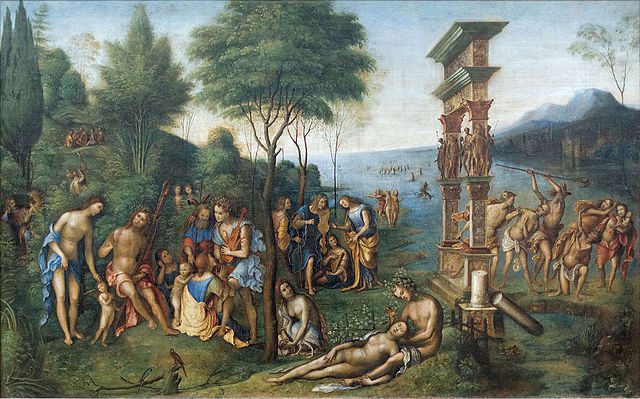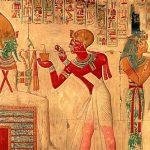 Pop Culture
Pop Culture  Pop Culture
Pop Culture  Weird Stuff
Weird Stuff 10 Everyday Activities That Were Once Considered Illegal
 History
History Ten of History’s Hidden Secrets: Stories 99% Don’t Know About
 Movies and TV
Movies and TV 10 Actors Who Infamously Stormed Off Set While Filming
 Food
Food 10 Foods That Have Alleged Occult Powers
 Sport
Sport 10 Lesser-Known Multi-Sport Alternatives to the Olympics
 Humans
Humans 10 Real Life Versions of Famous Superheroes
 Gaming
Gaming 10 Overused Game Villains
 Mysteries
Mysteries Ten Mysterious “Ghost Ship” Stories That Still Keep Us Wondering
 Technology
Technology 10 Times AI Replaced Humans (and No One Noticed)
 Pop Culture
Pop Culture 10 Things You Might Not Know about Dracula
 Weird Stuff
Weird Stuff 10 Everyday Activities That Were Once Considered Illegal
 History
History Ten of History’s Hidden Secrets: Stories 99% Don’t Know About
Who's Behind Listverse?

Jamie Frater
Head Editor
Jamie founded Listverse due to an insatiable desire to share fascinating, obscure, and bizarre facts. He has been a guest speaker on numerous national radio and television stations and is a five time published author.
More About Us Movies and TV
Movies and TV 10 Actors Who Infamously Stormed Off Set While Filming
 Food
Food 10 Foods That Have Alleged Occult Powers
 Sport
Sport 10 Lesser-Known Multi-Sport Alternatives to the Olympics
 Humans
Humans 10 Real Life Versions of Famous Superheroes
 Gaming
Gaming 10 Overused Game Villains
 Mysteries
Mysteries Ten Mysterious “Ghost Ship” Stories That Still Keep Us Wondering
 Technology
Technology 10 Times AI Replaced Humans (and No One Noticed)
10 Ancient Gods and Goddesses Who Were All about Debauchery
Most of us know about golden boy Zeus, the king of the gods who was known for his strength, or about Athena, who was said to be the goddess of wisdom. However, some ancient gods seemed to be focused more on the dark side than on helping humanity. Here are ten ancient gods and goddesses who were all about drinking, debauchery, and the dark side of life.
Related: 10 Quenching Legends, Myths, And Stories Involving Alcohol
10 Bacchus
Bacchus was an ancient Roman god who was in charge of wine, revelry, and fertility. In other words, he was fond of the more carnal pleasures in life. On top of that, this god was in charge of the theater and the arts in general.
As you can probably imagine, Bacchus was associated with some pretty wild festivals. These festivals were known as Bacchanalia and involved heavy drinking and dancing. Many of these festivities took over the city, leading to an abundance of debauchery and wickedness throughout the entire town.
In fact, the festivals got so out of hand that in 186 BC, the Roman Senate decided to put a stop to them. The senate was concerned that moral corruption and lack of supervision were causing the festivals to run a little too wild.[1]
9 Xōchipilli
Xōchipilli is an Aztec god who was the patron of a number of pleasures in life. Love, fertility, art, flowers, and homosexuality were all things that this particular god was in charge of. In fact, the name Xōchipilli even translates to “prince of flowers!”
Whereas Bacchus was associated with wine, archeologists believe that Xōchipilli had more to do with hallucinogens. It’s believed that when worshippers went to adore this particular god, they would take hallucinogenic mushrooms. Some statues of this deity have even been found to be sitting amid psilocybe mushrooms.
Besides the mushrooms, ceremonies surrounding this god usually involved pulque, an alcoholic drink made from agave. Then, during the ceremonies, a good deal of male prostitution would take place, as this particular god oversaw homosexuality.
Today, this god has largely disappeared from Mexican culture, except in museums. However, pulque still remains a popular drink in Mexico, and you can now participate in that part of the ceremony without having to worry about any of the other debaucheries that once occurred.[2]
8 Cybele
Cybele was a goddess who originated in Phrygia—an ancient district in west-central Anatolia (modern-day Turkey)—and was considered the mother of the gods. Despite being a mother figure, Cybele was definitely a goddess who had a lot to do with debauchery.
This particular goddess had a series of rights associated with her, which were called the Orgia. These rights involved a great deal of drinking and hectic music, as well as wild dancing by the participants.
During these orgies, self-castration and other forms of mutilation were also common. Despite all this debauchery, the Greek and Roman governments eventually had enough. Like what happened with the festivals of Bacchus, the government eventually decided to tone these festivities down in order to keep the public order and accommodate peoples’ sensibilities[3]
7 Mayahuel
Xōchipilli wasn’t the only Aztec god who seemed to get up to no good. Another god who seemed to have enjoyed partying was Mayahuel. Mayahuel was known as the goddess of fertility, the maguey (agave) goddess, and the ruler of the eighth day and the eighth trecena. She was thought of as bringing love to mankind and lifting the spirit of people who, at times, appeared to be miserable.
She was a representation of the many products produced from a maguey plant, including Mezcal and pulque, a foaming drink made from fermenting maguey aguamiel—which is sap or “honey water.” Pulque played an important role since it was the traditional drink that Aztecs consumed during religious ceremonies and festivals, agricultural ceremonies, wedding celebrations, fertility rites, and more.
One myth surrounding Mayahuel says that the goddess was married to and impregnated by Patecatl. He was known as the “lord of the root of pulque” and was also referred to as the god of healing and the god of medicine. He was known to give comfort when ill or sick through resources such as peyote, magic mushrooms, and herbs in the form of datura, morning glory, and cannabis. These methods were used in healing, shamanism, fortune telling, and public religious ceremonies. These elements also helped tranquilize sacrificial victims and provoke the sacramental nature of the ritual.
Their children were the 400 rabbits, also known as the “gods of drunkenness” or the “Centzon Totochtin.” They represented an endless number of deities or gods drinking the juice from an agave plant or characters a person could exhibit when over intoxicated.[4]
6 Bastet
Ancient Egypt’s pantheon of gods is full of unique characters, such as Osiris, Isis, and Ra. One of their gods who was associated with some of the more earthly pleasures of life, however, is Bastet.
Bastet was a feline goddess who oversaw women, pleasure, passion, and joy. Now, with a goddess who governs those sensual pleasures, you can probably imagine what the Festival of Bastet was like.
During this festival, hundreds of thousands of Egyptians would gather together and drink copious amounts of wine. From there, the disciples would engage in dancing and revelry, getting drunk and celebrating their beloved goddess.
Besides the festival, some sources also state that Bastet appreciated people burning cannabis at her altar. Others may actually have consumed the stuff during rituals or worship sessions, showing just one more way that this goddess was fond of the more contraband things in life.[5]
5 Sekhmet
Closely related to Bastet is the Egyptian goddess Sekhmet. This goddess was particularly fond of wine, as can be seen in her mythology story.
According to legend, Sekhmet was a goddess who Ra charged with the destruction of mankind after finding out about the humans’ plot to overthrow him. Sekhmet was transformed into a lion and set about destroying the humans.
However, Ra changed his mind and felt sorry for the humans. In an effort to stop Sekhmet from finishing the task he had assigned her, Ra flooded the fields with red beer. Sekhmet didn’t realize that the red liquid was beer and drank so much of it that she fell asleep, saving humanity from destruction.
To celebrate the fact that Sekhmet got drunk and forgot about killing humans, the ancient Egyptians celebrated the Festival of Drunkenness once a year. The whole point of this festival was to get so drunk that you’d end up falling asleep. Then, once worshippers woke up, they’d worship Sekhmet through sex and dancing.[6]
4 Yi-ti
China is another country that’s worshipped drunken gods at one point or another. In China, the god who once oversaw drinking and revelry was a god named Yi-ti. Yidi first appeared during the Xia Dynasty, which was the first dynasty in ancient China.
According to legend, the daughter of a great Emperor, wanted to give her father a very special present. She spoke to Yi-ti about this gift, and he began experimenting with fermenting rice.
After a while, Yi-ti found that he could make a uniquely strong and spicy drink from the rice, ultimately making the big discovery of how to make wine, called jiu. Emporer Yu apparently liked the stuff but instantly sensed it could be dangerous if drunk in excess. As a result, Yu banned jiu brewing and distanced himself from Yi-ti.
As the story goes, however, after Yu died, the Chinese people began brewing jiu again and offering it to their gods in large, monster-engraved bronze vessels. After the offering was made, worshippers would drink the jiu themselves.
However, this practice didn’t last for very long, it seems. Later, during the Zhou Dynasty, a prohibition was imposed that got rid of jiu and largely led to people forgetting about the ancient Chinese goddess. Over the years, jiu went back and forth between being consumed in great amounts and being prohibited. However, today, there’s a healthy drinking culture in China.[7]
3 Akan
Akan was a Mayan god of drinking, death, and disease. Not much seems to be known about this particular god, except that he was in charge of warding off a year of death.
Akan was mostly associated with a drink called balché, which was an alcoholic beverage made from honey and tree bark. According to some sources, Akan loved to get intoxicated with the beverage and make a fool of himself.
Even though little is known of the Mayan god Akan, it seems he’s certainly made an impact on Mexican culture. Today, there are still people who enjoy drinking a glass or two of Balché from time to time.[8]
2 Tlazōlteōtl
Perhaps one of the ancient gods most involved in debauchery and revelry, Tlazōlteōtl was the Aztec goddess of lust, sexual impurity, and steam baths. In fact, she was so devious in her ways that she was considered the patron goddess of adulterers.
Tlazōlteōtl was said to have four different forms: a young temptress, a middle-aged gambler, a slightly older purifier of sins, and a hag preying on young people. According to Aztecs, this goddess would tempt people into committing sins but would then later purify them for those same sins. The only catch is that worshippers could only be forgiven once in their life.
While this goddess doesn’t seem to have inspired any sinful rituals or festivals, she certainly was happy to carry out devious activities herself. Whether she was purporting adultery or preying on youths, Tlazōlteōtl was certainly a goddess with a knack for deviance.[9]
1 Comus

Dionysis is the Greek equivalent of the Roman god Bacchus. And, according to Greek mythology, Dionysus had a son who seems to have been even more caught up in earthly pleasures than his father!
The son, whose name is Comus, was the god of revelry, nighttime dalliances, and festivities. Comus was a representation of chaos and served his father as a cupbearer.
As with many other ancient deities, Comus had a festival that came around every year. Despite the god’s association with drinking to excess, however, this god’s festival was characterized by men and women exchanging clothes.
Perhaps Comus would have preferred something a bit wilder for his festivities, or perhaps to ancient Greeks, trading clothes was already a wild enough idea. It’s up to you to decide why this custom may have come about.[10]








